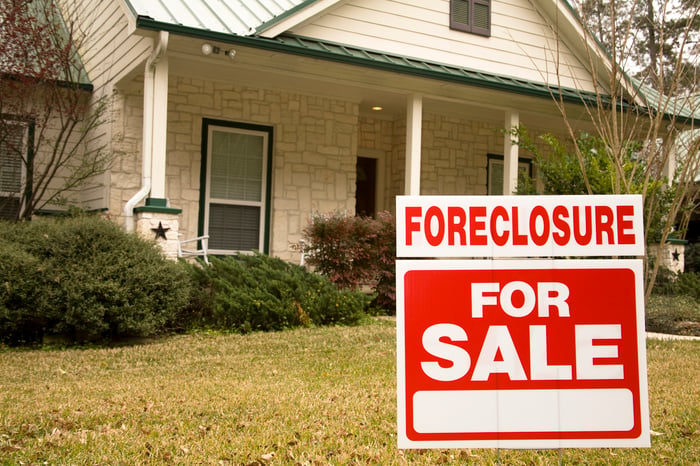In February, the median existing home sale price rose to $357,300, per the National Association of Realtors, marking a 15% increase from a year prior. With property values soaring on a national level, you may be thinking of investing in a foreclosure to add to your real estate portfolio. There can be benefits to going this route -- but there could also be a lot of risk.
The upside of buying a foreclosure
The primary benefit of buying a foreclosed property? The option to snag a discount.
You're generally looking at paying less for a foreclosure than a comparably sized property that's being sold willingly. And so that gives you a couple of solid opportunities.

Image source: Getty Images.
First, you could sink some money into a foreclosure to get it up to snuff and then convert it to an income property. That could be a good route to take if you don't need your capital back right away and you're willing to sit back and let that property appreciate in value.
You can also look at buying a foreclosure, doing a quick flip, and selling it for a near-term profit. That's an option worth considering if you don't want to tie up too much in a single property.
The downside of buying a foreclosure
It's true that you might scoop up a foreclosure at a discounted price -- but there's a reason for that. Foreclosed homes are often left in disarray, and from there, it's on the buyer to pick up the pieces.
In some cases, that could mean making minor repairs. But often, it means dealing with major issues -- things like replacing a roof, overhauling a heating system, or repairing a damaged foundation.
All told, when you buy a foreclosure, you could risk untold expenses that eat into or negate your profits, especially if you're in the business of flipping houses. And that's a risk you may not want to take.
Furthermore, in some cases, you may not even get to scope out a foreclosure before buying it. If you're buying a foreclosure at auction, for example, you'll generally need to put in a bid sight unseen. That could open the door to added savings on your purchase price -- but also, added risk.
Should you buy a foreclosure?
Right now, foreclosures aren't so easy to come by. The reason? Home values are sitting at record highs, which means fewer property owners are underwater on their mortgages. This means many people who can no longer afford their mortgage payments have the option to simply list their homes and sell them.
Also, in the wake of the pandemic, mortgage loan servicers are working with property owners to get current on and keep up with their home loans. Many are offering up the option of loan modification to help homeowners retain their homes rather than lose them.
Still, there are foreclosures to be found -- but whether you should invest in one will largely hinge on your personal appetite for risk. If you're a more conservative real estate investor looking to build a portfolio of income properties, you may want to stick with nonforeclosed homes. If you're in the house flipping business, foreclosures offer more appeal. But even then, you'll need to understand the risks you're taking on.
All told, there's no right or wrong answer, especially since every foreclosure is different. But if you're going to invest in foreclosures, just be prepared to face a world of repairs. And if you're flipping a foreclosure, aim for a market where demand is high and inventory is low. That way, you'll be more likely to come out ahead financially, even if your repairs end up costing more than expected.






